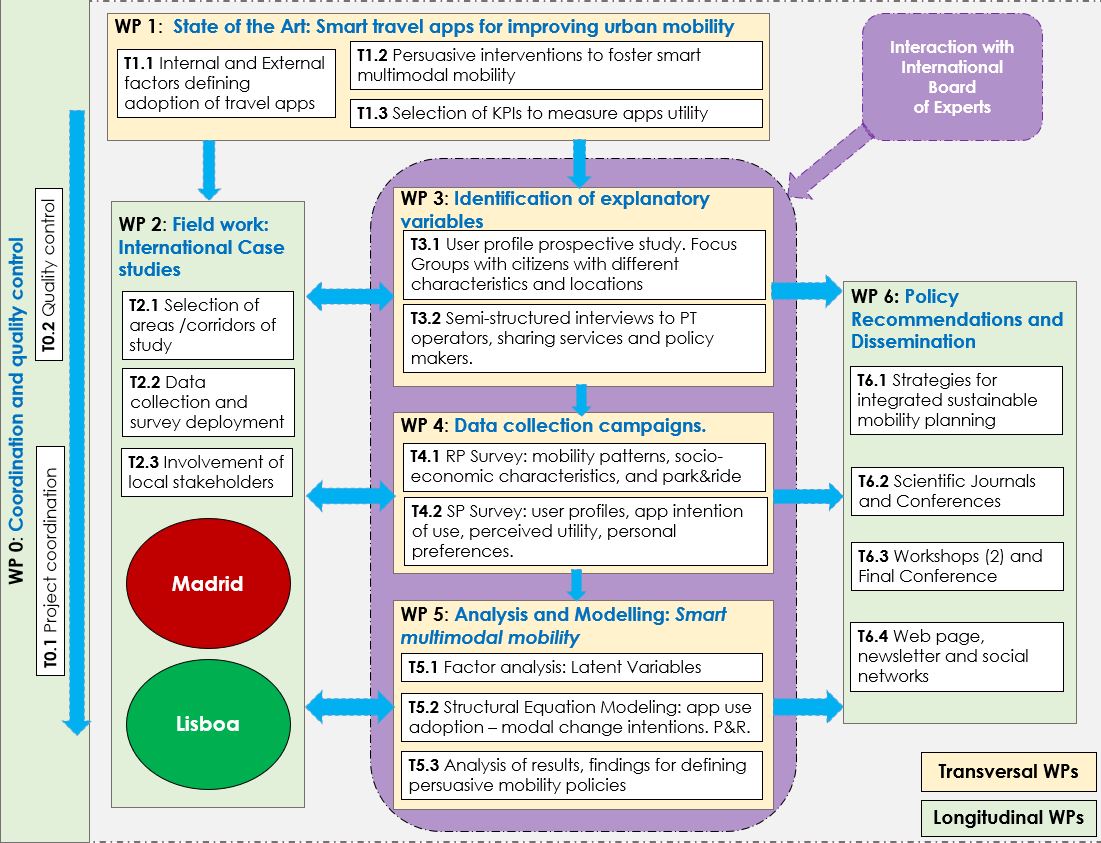The project work plan is based on the interaction among 3 longitudinal and 4 transversal WPs (see figure below).

WP0 – Project Coordination
WP0 is aimed to perform two main activities along all the project lifetime. The fist is to assign and coordinate the specific tasks to researchers, and the second is to control the quality of the process and the outputs.
WP1 – State of the art: smart travel apps for improving urban mobility
Review of the scientific literature for identifying internal and external factors for the adoption of travel apps and their impacts on changing mobility behaviour. Identification of KPIs to measure urban travel apps utility.
WP2 – Field work: international case studies
The research is planned to be developed in three different cases of study: the metropolitan areas of Madrid and Lisbon, and the small spanish city of Cáceres.
Consists of selecting specific corridors and areas for surveys for each case study. Conduct pilot surveys and focus groups to identify drivers of application use and their impact on travel behavior. Ensure local stakeholder support for the successful completion of the surveys.
WP3 – Identification of explanatory variables
To identify key variables as input for the quantitative analysis. Focus Groups with citizens (users of the different transport options) and interviews with stakeholders (operators, decision makers, sharing services.) in Madrid, Lisbon and Cáceres.
WP4 – Data collection campaigns
Conducting the Revealed and Declared Preferences surveys applied to the Case Studies, based on the results of the previous work packages (state of the art, KPIs to measure the usefulness of the apps, case studies and Focus Groups. The data collection campaigns will be carried out once the case studies have been defined (WP2) and the key variables have been selected (WP3).
WP5 – Analysis and modelling: smart multimodal mobility
The data analysis of the results obtained in the survey campaigns will include exploratory and confirmatory factor analysis followed by a structural equation model to empirically validate the framework. Analysis of results, findings for defining persuasive mobility policies. Special participation of the international board of experts will be required so it will be possible to validate the models
WP6 – Policy recommendations and dissemination
Implications for integrated sustainable mobility planning and governance and strategies recommendations. Dissemination of the results among the available channels:
- Scientific journals and conferences,
- Workshops and a final conference on U-MOVE achievements, with the invitation of public authorities and companies and organizations interested in the project (ITS-Spain, ALSA, CRTM, CIVINET, ATUC, Madrid City Council, Carris, Lisbon Metropolitan Area, etc.).
- Web page, and social networks (Twitter and LinkedIn) to show the progress of the project.